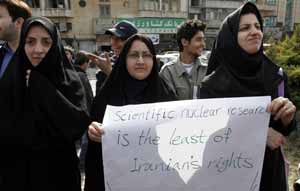
International security a pawn in the game big powers playNEW YORK - After the massive international outrage that followed the US military disaster in Iraq, the UN Security Council remains wary about providing any political or legal cover that will justify a future American invasion — be it North Korea, Iran or Syria.
The US used a loophole — and a misinterpretation of a UN resolution — to claim legitimacy to its military invasion of Iraq despite the fact that the Security Council did not unequivocally provide a justification for the attack or adopt a resolution declaring war against Iraq. As a result of this misconception — deliberate or otherwise — Russia and China are reluctant to declare that any future crisis should be deemed "a threat to international peace and security," unless it really is. The Iraqi invasion of Kuwait in August 1990 was considered a threat to international peace and security and therefore had the blessings of the Security Council. But the Council did not provide similar authorization for the US invasion of Iraq in March 2003. As a result of this debacle, the US is finding it increasingly difficult to get Security Council support for another possible military attack, this time against Iran. Iran says its nuclear programme is for peaceful purposes but the Americans argue that Iran's enrichment programme could lead to the production of nuclear weapons. As a nuclear power, the US swears by the maxim: Do as we say, not as we do. In the Security Council, the US is supported by two other veto-wielding permanent members, namely Britain and France. But the other two veto-wielders, China and Russia, are playing it hard to get. The Big Five are also the world's five declared nuclear powers. Both China and Russia are also trying to protect their national interests and their political, economic and military relationship with Iran. The stalemate is being played out in closed door negotiations in the Council's chambers. A resolution adopted last December imposed restrictions on the export of nuclear materiel and technology to Iran, and the freezing of financial assets of officials involved in the nuclear programme. The proposed new resolution, currently under discussion, is expected to expand some of these restrictions — besides a travel ban on Iranian officials linked to the nuclear programme, and restrictions on export guarantees and credits. The reason: the Russian Federation is one of the primary arms suppliers to Iran and accounts for billions of dollars worth of military exports. "An arms embargo is very unlikely," says an Arab diplomat, who is also quick to point out that "just as much as Washington is protective of its political and military relationship with Israel, the Russians are equally protective of their economic and military relationship with Iran." "If you try to impose military sanctions on Israel, the United States will exercise its veto, and if you try to do the same to Iran, the Russians will veto it." The economic stakes on the proposed resolution are high. Nicholas Burns, a senior U.S. State Department official and one of the lead negotiators of the proposed draft resolution, was quoted as saying there would be no sanctions on the oil and gas trade either. According to the Washington-based Congressional Research Service (CRS), Russia's arms transfer agreements with Iran totaled over $2 billion during 2002-2005. The last known major deal, confirmed in December 2005, has a potential worth of $1 billion to $1.5 billion, says Tom Baranauskas, a senior Middle East analyst at the US-based Forecast International, a leading provider of defence market intelligence services in the United States. When the first Security Council resolution against Iran was adopted late last year, the US was forced to drop its plans to impose sanctions against Iran's nuclear plant in Bushehr because of strong reservations expressed by Russia. The Russians are helping Iran to build that facility. If Washington had insisted on sanctioning the nuclear plant, the Russians would have vetoed that resolution. But it passed muster after the proposed sanctions against the nuclear plant were removed. In the case of Israel, which is protected against Security Council sanctions by Washington, the United States has been the major arms supplier. According to CRS, there was a total of $8.4 billion of arms deliveries to Israel during 1997-2004, with fully $7.1 billion or 84.5 percent coming from a single source: the US. A major factor in this trend was the rise in US Foreign Military Financing (FMF) — outright American grants to Israel — which now totals about $2.3 billion a year paid for by US taxpayers. The bottom line is that international peace and security are also inextricably linked to the economic and military interests of the world's big powers |
|| Front
Page | News | Editorial | Columns | Sports | Plus | Financial
Times | International | Mirror | TV
Times | Funday
Times || |
| |
Copyright
2007 Wijeya
Newspapers Ltd.Colombo. Sri Lanka. |
